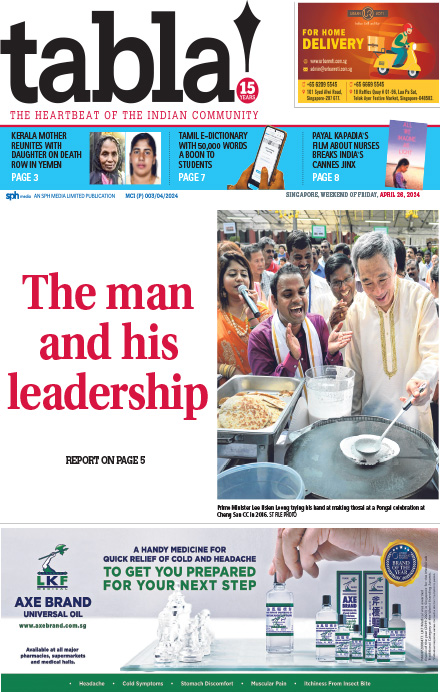Iconic films like the 1995 Shah Rukh Khan-starrer Dilwale Dulhania Le Jayenge (DDLJ) are best left untouched.
That is the reaction of fans of the movie after its Broadway adaptation, created by director Aditya Chopra himself, made its debut.
Come Fall In Love - The DDLJ Musical opened on Sept 14 at the Old Globe Theatre in San Diego in the US.
The lyrics are by Nell Benjamin, who also wrote the screen-to-stage adaptations of US films Legally Blonde (2001) and Mean Girls (2004).
Indian-American actress Shoba Narayan plays Simran (played by Kajol in DDLJ), and the music is by Bollywood duo Vishal and Shekhar.
While many were initially curious about the adaptation, there was also furore among Indian fans over the casting of American actor Austin Colby as Raj Malhotra (played by Shah Rukh in DDLJ) and the whitewashing of the iconic movie.
DDLJ's highlight was the celebration of Indian culture, and to cast an American actor as Raj is just wrong, they felt.
The show's creators said they wanted to tell the story of two cultures coming together. But those critical of the casting decision see a missed opportunity.
Amid increasing demands for more inclusive hiring and storytelling in the American entertainment industry, South Asians are still underrepresented onstage and on screen, reported Variety.
"Just when you think we are moving on upwards, we are right back to square one. Why can't our stories be told as they are? Without a whitewash?" tweeted Andy Kumar, an India-based performer known as VJ Andy.
On Instagram, negative comments were sprinkled among the responses to Colby's excited post about his casting.
"Haven't y'all colonised enough," one user wrote.
Another commented: "It is embarrassing that as a white man, you are willingly stealing opportunities from men of colour. This isn't something to be proud of."
Chef and restaurateur Vikas Khanna, who was born in India and lives in New York, also expressed disapproval on social media.
He said: "They took away a star from us. All these guys would have gone in for auditions and the parents would have been: 'My God, my boy is going to be Raj!'
"Doing this, you're making our kids feel less-than. Let's not move backwards. We've worked really hard to be on the stage."
DDLJ was one of the first Indian films to centre on a love story between non-resident Indians (known as NRIs) - a reflection of the large numbers who were emigrating.
It focuses on two young NRIs living in London. Party boy Raj is rich, entitled and Western - quite the opposite of old-fashioned Simran and her hardworking, traditional father who says to Raj in the film: "You call yourself an Indian? You give India a bad name."
But when Simran returns to India for her arranged marriage, Raj and Simran try to persuade her father to let their love conquer all. The movie also resonates because of its focus on love of country and family.
"The film touched a nerve with NRIs, who were navigating between two or three cultures," explained Rajinder Dudrah, a professor at the Birmingham Institute of Media and English.
"Individuals were having to grapple with the tension between Indian tradition and Western ideas, just as this movie was highlighting them.
"The idea of the heart is Indian was also conveyed in the film, meaning that no matter where in the world you were, if you were of Indian descent, you had an attachment to India."
Although the musical includes nods to the film - pigeons, fields of mustard flowers, a mandolin cameo and the narrative arc, it is decidedly American.
Raj has been transformed into Roger (or Rog), and the leads now live in Massachusetts, meeting as Harvard students in Cambridge.
DDLJ was Chopra's directorial debut, and the cult following around it is remarkable.
It opened in 1995 and is still playing in a theatre in Mumbai. The film remains popular thanks to toe-tapping songs that grabbed audiences from the get-go and a charismatic lead pairing.
In an Instagram post last month, Chopra tried to justify choosing Colby: "The most powerful way to depict a country's culture and values is to see it from the perspective of someone who does not belong to the same culture."
The show's writers stressed that the production still featured a predominantly South Asian cast, including Shoba, and a production spokesman said South Asians represented more than half of cast members.
"It's not about colour, it's not about white or brown," said one of the show's composers Vishal Dadlani.
"It's about a boy who's in love with a girl and whose family is different from the girl's family."
In an analysis of representative politics, a study by The Guardian found that in 2020, only 6.9 per cent of the roles in the American film industry went to Asian-American actors (down from 7.3 per cent in the previous year). These dismal numbers make the casting of Colby look even worse.
"Overall, Come Fall In Love underwhelms - you're more likely to fall in like than love," wrote Shalini Dore in Variety.
Indo-Asian News Service
"Just when you think we are moving on upwards, we are right back to square one. Why can't our stories be told as they are? Without a whitewash?" - Andy Kumar, an India-based performer known as VJ Andy, in a tweet



